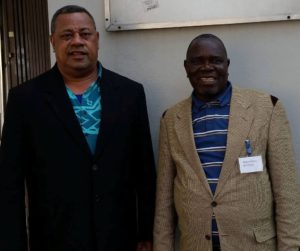PIANGO TO MONITOR SHRINKING CIVIC SPACES IN SIX PACIFIC COUNTRIES
Suva – The Pacific islands Association of NGOs will be monitoring civic spaces in Australia, Fiji, New Zealand, Papuan New Guinea, Solomon Islands and Vanuatu as a means of ensuring enabling environments exist for CSOs. This follows a training in Johannesburg, South Africa held on 24 – 26 of May 2016 and attended by PIANGO representative, Mr. Laitia Tamata.

Mr Laitia Tamata and Robert Mabala, Coordinateur Régional chez REPONGAC, Democracti Republic of Congo
“PIANGO will represent the Pacific as a research node for the global civil society monitor with World Alliance of Citizen Participation (CIVICUS),” said PIANGO Executive Director, Ms Emele Duituturaga.
“Each of these selected countries will operate as a national research node through their National Liaison Units (NLUs; the umbrella body) and provide PIANGO the required detailed information,” she said.
“The Civic Space Monitor (CSM) is a tool that tracks the health of civic space – measured by criteria such as the freedom of expression, association and peaceful assembly (3 Rights) – in all countries around the globe. -. The CSM is a research collaboration between CIVICUS, our members and their respective partners,” she said.
In its 2014 – 2015 State of Civil Society reports, CIVICUS described how people everywhere are challenging dominant models of economic and political governance, organizing protest and raising levels of direct citizen action. It was also observed that it was becoming harder to engage in the kinds of active citizenship required to challenge this political and economic status quo.
PIANGO was invited by CIVICUS[1] in March 2016 to elevate its membership and engagement so that the Pacific Region could be included in the Civic Space Monitor (CSM), an initiative by CIVICUS that is in line with the line of CSO work in the Pacific.
In this exercise, PIANGO, as a platform, is sharing the work it does with its members and partners through the SDG 10 and 6 in particular with multilateral ties to SDG 1 – 17.
“This is also tied to the Busan Declaration in monitoring the enabling environment created by States for CSOs. Whilst the CSM is focusing on the 3 x Rights and 1 x Duty of the State, the indivisible nature of Human Rights implies a multilateral connectivity that enable a view of the issue as a holistic singular right,” she said.
Ms Duituturaga said the two monthly report will include examples of key events such as large scale protest, legislative forms, proposals, and statements from government officials or political leaders, arrests of activists, convictions or acquittals related to civic space abuses censorship and other issues.
“The measure of the Duty of the State is deduced from the promotion and protection of the 3 rights,” she said.
ENDS
